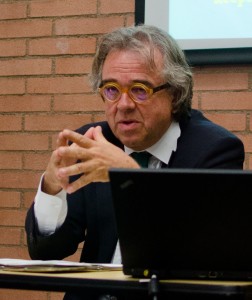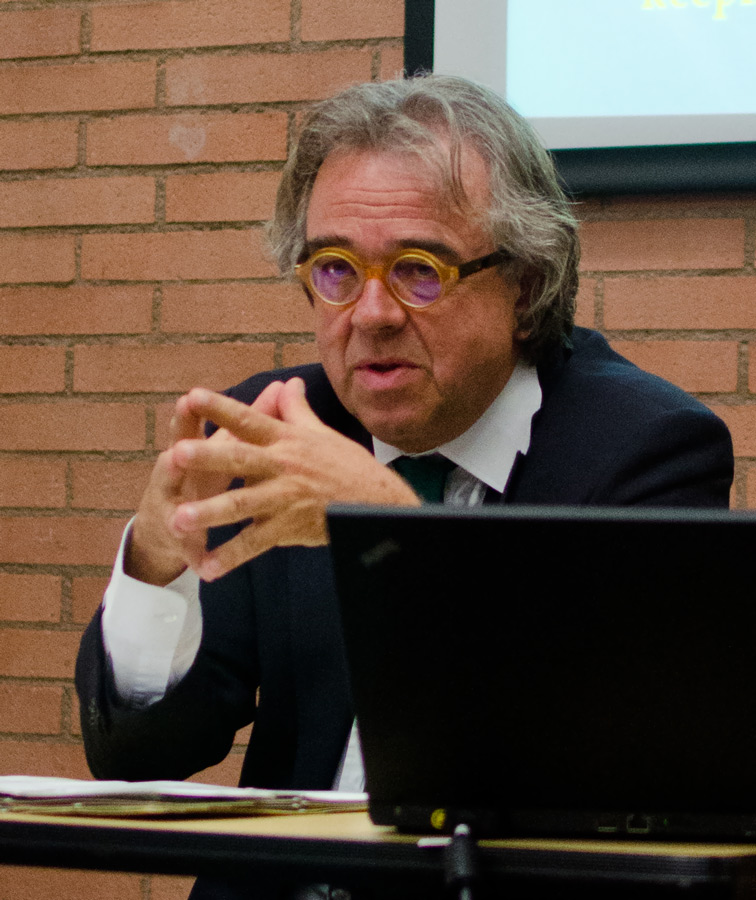EU official visits ’SC
Michael Reinprecht, a current European Union official and former Austrian diplomat, discussed the EU Neighborhood Policy with students on Thursday afternoon.

Foreign affairs · European Union official Michael Reinprecht met with students to discuss current and past crises facing the organization. – Kirstin Louie | Daily Trojan
The event was hosted by the International Relations Undergraduate Association, an organization that strives to connect students with professionals in the field of international relations.
Adela Jones, a member of the executive board for the association, gave insight into its hope to make a difference among the student body.
“A lot of planning and foresight goes into these events,” she said. “Relevance is especially important to keep in mind — we want to keep [international relations] students informed on current events by connecting them with experts on the subject, people who have firsthand experience.”
Reinprecht began the event with a discussion on the state of the current European Union Neighborhood Policy. This policy is not to be confused with the European Union itself, but rather something developed to prevent dividing lines between the EU and its new neighbors.
“It is not to be mistaken for a waiting room for membership into the EU,” Reinprecht said.
The ENP shares the same goals as the EU, as it aims to build upon mutual commitments to common values throughout Europe. The EU itself dominated the discussion at the event.
The EU prides itself on inclusiveness, which was the basis for the ENP. There are certain conditions to joining the union, however, which Reinprecht listed.
“To become a member, a nation-state must have a functioning market economy, democratic structures, rules of human law and respect for common rules and policies,” Reinprecht said.
These conditions prevent Ukraine and Russia from being a part of the EU. These two nations were the main topics of discussion as they fueled the creation of the ENP. Reinprecht, however, mentioned that both are strong candidates for potential membership.
“Although there would be mutual benefit in including both Russia and the Ukraine to the EU, the countries do not fit within the standards yet,” Reinprecht said.
The EU has promising future plans. Between now and 2020, they plan to put an emphasis on pre-accession assistance, peacekeeping, human rights action and the spread of democracy, Reinprecht said. He discussed how the EU plans to reward nations that support democratic values by giving them further economic support.
“The EU has allocated 50 billion euros to this project. This is about 20 million U.S. dollars,” Reinprecht said.
The students attending the event matched Reinprecht’s passion for the subject.
“Having someone extremely knowledgeable share his opinions gives us a different view on current events,” said Brian Sun, a senior majoring in international relations.
Juhee Shah, a freshman majoring in health and humanity, echoed Sun’s sentiments.
“It’s a different experience than if you just learned all this in a class,” Shah said. “It’s a whole different perspective to hear from someone with personal experience.”
The event ended with a conversation about the future of the EU. Reinprecht admitted that “this is an open question because no one really knows.” He continued to name the United States as an example for promising outcome.
Whether or not Russia and Ukraine become members of the Union is uncertain. Reinprecht emphasized, however, that the EU is moving forward regardless. Reinprecht closed the discussion on an optimistic note, saying, “One day the whole of Europe may be living cooperatively under the EU umbrella.”

